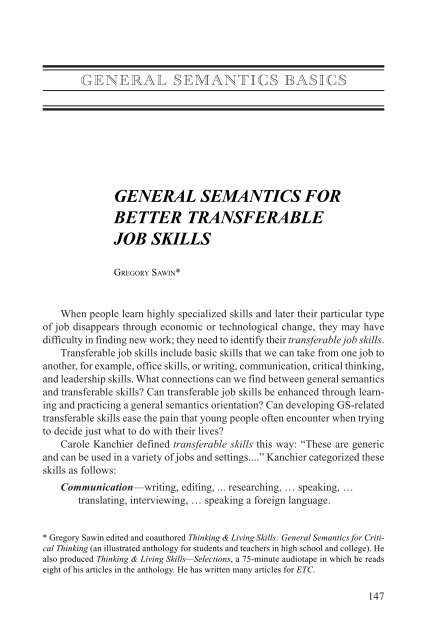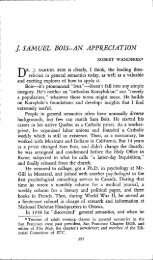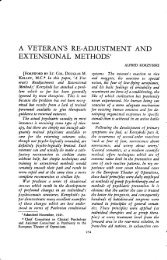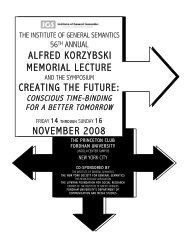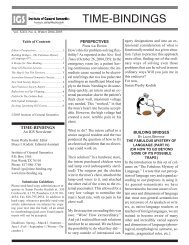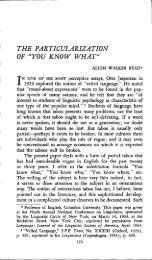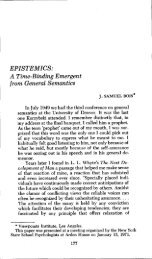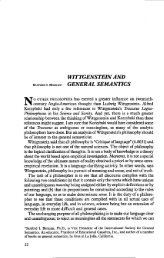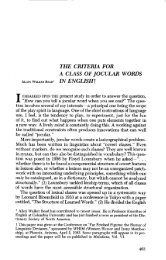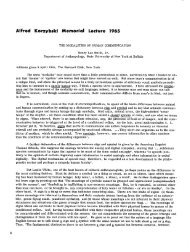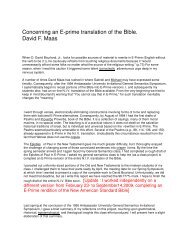Maa61-1 Maas Education - The Institute of General Semantics
Maa61-1 Maas Education - The Institute of General Semantics
Maa61-1 Maas Education - The Institute of General Semantics
Create successful ePaper yourself
Turn your PDF publications into a flip-book with our unique Google optimized e-Paper software.
GENERAL SEMANTICS BASICS 147<br />
GENERAL SEMANTICS BASICS<br />
GENERAL SEMANTICS FOR<br />
BETTER TRANSFERABLE<br />
JOB SKILLS<br />
GREGORY SAWIN*<br />
When people learn highly specialized skills and later their particular type<br />
<strong>of</strong> job disappears through economic or technological change, they may have<br />
difficulty in finding new work; they need to identify their transferable job skills.<br />
Transferable job skills include basic skills that we can take from one job to<br />
another, for example, <strong>of</strong>fice skills, or writing, communication, critical thinking,<br />
and leadership skills. What connections can we find between general semantics<br />
and transferable skills? Can transferable job skills be enhanced through learning<br />
and practicing a general semantics orientation? Can developing GS-related<br />
transferable skills ease the pain that young people <strong>of</strong>ten encounter when trying<br />
to decide just what to do with their lives?<br />
Carole Kanchier defined transferable skills this way: “<strong>The</strong>se are generic<br />
and can be used in a variety <strong>of</strong> jobs and settings....” Kanchier categorized these<br />
skills as follows:<br />
Communication—writing, editing, ... researching, … speaking, …<br />
translating, interviewing, … speaking a foreign language.<br />
* Gregory Sawin edited and coauthored Thinking & Living Skills: <strong>General</strong> <strong>Semantics</strong> for Critical<br />
Thinking (an illustrated anthology for students and teachers in high school and college). He<br />
also produced Thinking & Living Skills—Selections, a 75-minute audiotape in which he reads<br />
eight <strong>of</strong> his articles in the anthology. He has written many articles for ETC.<br />
147
148<br />
ETC • APRIL 2004<br />
Humanitarian—advising, coaching, counseling, mentoring, …<br />
training, … explaining, listening, negotiating.<br />
Creative—performing, … cooking, designing, … inventing …<br />
Organizational—leading, deciding, delegating, scheduling, supervising,<br />
calculating, budgeting, evaluating, planning, coordinating …<br />
Analytical—analyzing, … synthesizing, conceptualizing, categorizing,<br />
problem-solving, … researching, observing …<br />
Technical—repairing, … building, keyboarding, measuring, testing,<br />
… programming …<br />
Physical—body coordination, … finger dexterity, physical strength …<br />
Kanchier goes on to say that “to further pinpoint your skills, identify three<br />
things you’ve done that have given you a great sense <strong>of</strong> pride, accomplishment<br />
and satisfaction. <strong>The</strong>se successes can come from any area <strong>of</strong> your life. ... <strong>The</strong><br />
skills you used to accomplish these ... are your power skills. <strong>The</strong>y can be personal,<br />
transferable, or pr<strong>of</strong>essional.” (1)<br />
According to Urban Whitaker (2, 3, 4), transferable skills are those abilities<br />
that employers believe are the most important for employees to have. A list <strong>of</strong><br />
76 transferable skills was compiled by researchers at San Francisco State University.<br />
This list was the outcome <strong>of</strong> two conferences on transferable skills: one<br />
at the University <strong>of</strong> California at Los Angeles, and the other at the Far West<br />
Laboratory for <strong>Education</strong>al Research and Development in San Francisco. Each<br />
conference consisted <strong>of</strong> more than 150 employers, employees, and educators<br />
who tried to answer one question, “What skills contribute most to career success?”<br />
Whitaker wrote, “<strong>The</strong> 76 answers that emerged are grouped in nine categories<br />
ranging from [spoken and written] communications and critical thinking to<br />
information management and interpersonal relations.”<br />
By studying and applying general semantics, one can cultivate many <strong>of</strong> the<br />
transferable job skills noted by Kanchier and Whitaker. Transferable skills such<br />
as critical thinking, communication skills, and interpersonal skills are perhaps<br />
the most important, and the most frequently cited in general semantics publications.<br />
<strong>The</strong> choice <strong>of</strong> general semantics as a subject <strong>of</strong> study can also help reduce<br />
the confusion and distress that arises when young people are under pressure<br />
to decide, perhaps prematurely, just what they want to do in life.<br />
Today’s 21st century students face difficult and agonizing questions as the<br />
numbers and types <strong>of</strong> career possibilities continue to grow. I can appreciate<br />
their reluctance to commit to a major in college at such an early stage in their<br />
journey <strong>of</strong> self-discovery. <strong>The</strong>y may have only a vague idea <strong>of</strong> the variety <strong>of</strong>
GENERAL SEMANTICS BASICS 149<br />
careers that a particular college major could lead them to. <strong>The</strong>y probably don’t<br />
know what their strengths are, or what they like. <strong>The</strong>y probably have more<br />
questions than answers:<br />
“Who am I now?”<br />
“What can I become?”<br />
“What do I want to do?”<br />
“What are my talents, aptitudes, values, and passions that set me apart<br />
from other people?”<br />
“What kinds <strong>of</strong> people do I want to work with?”<br />
“Who can I help?”<br />
“Which kinds <strong>of</strong> companies, organizations, or other groups in society<br />
would appreciate my skills and potentials?”<br />
“Which <strong>of</strong> these potentials can I develop for a satisfying career?”<br />
“In this puzzle <strong>of</strong> society, this puzzle <strong>of</strong> myself, where will I fit in and<br />
what will I be?”<br />
In spite <strong>of</strong> their uncertainties, students may feel pressure to declare a college<br />
major or a career path, and then head out into the world with the hope that<br />
they know what they’re doing. But students may also fear that they have committed<br />
themselves to years <strong>of</strong> education, training, or spare-time study that could<br />
turn out to be largely irrelevant if they change their minds, change their majors,<br />
and then follow a different career path, or if the job market changes in certain<br />
ways.<br />
Kathleen Mitchell, a counselor and instructor at City College <strong>of</strong> San Francisco,<br />
points out that feeling uncertain about what type <strong>of</strong> career to pursue is<br />
very appropriate in an increasingly complicated work world. She wrote that,<br />
“People who are reluctant to answer questions like ‘What do you want to do?’<br />
and ‘What will you do with that college major?’ are … unfairly<br />
labeled…indecisive.” She concluded, “Uncertainty inspires our curiosity. …<br />
By taking action on our curiosity, we place ourselves in situations where we<br />
will create and transform unexpected events into career opportunities.” (5)<br />
Most <strong>of</strong> the thinking and living skills that students can learn through general<br />
semantics will be useful in almost any future career.
150<br />
ETC • APRIL 2004<br />
REFERENCES<br />
1. Kanchier, Carole. (2000, July 16). “Identifying Your Crucial Work Skills.” <strong>The</strong><br />
San Francisco Examiner, page J-3. Kanchier is the author <strong>of</strong> Dare to Change<br />
Your Job—and Your Life (2000). She is principal <strong>of</strong> Questers, a career consulting<br />
group.<br />
2. Whitaker, Urban. (1998, June 14). “Transferable Skills Crucial for Those Who<br />
Want to Get Ahead.” <strong>The</strong> San Francisco Examiner, page J-3.<br />
3. Whitaker, Urban. (2002). Five Steps to Career Success: <strong>The</strong> Essential Guide<br />
for Students, Job Seekers and Lifelong Learners, 3rd edition. Oakland, CA:<br />
West Coast Print Center (books@westcoastprintcenter.com; (510) 663-7061).<br />
“Whitaker’s perceptions about career development and the importance <strong>of</strong><br />
making clear and thoughtful choices are presented in a practical, methodical,<br />
and enjoyable workbook format, with worksheets <strong>of</strong> grids and lists that can be<br />
easily copied, giving the reader the opportunity to redo exercises for interesting<br />
evaluative follow-up. [This workbook]…takes essential concepts in career and<br />
life planning and creates a productive five-step plan for the search for career<br />
and job satisfaction.” —Patty Cassidy, Director <strong>of</strong> Career Advising at Reed<br />
College in Portland, Oregon; National Society for Experiential <strong>Education</strong> (from<br />
her review <strong>of</strong> the book at the amazon.com web site).<br />
4. Whitaker, Urban, and Paul Breen. (1995). Bridging the Gap: A Learner’s Guide<br />
to Transferable Skills. <strong>The</strong> Learning Center. Additional Paul Breen information<br />
was provided by e-mail from Whitaker to the author.<br />
5. Mitchell, Kathleen. (1998, October 25) “In Praise <strong>of</strong> Uncertainty,” <strong>The</strong> San<br />
Francisco Examiner, page J-3.<br />
GREGORY SAWIN<br />
1950-2004<br />
With deep sadness, we report that Gregory Sawin died on Friday, March 12,<br />
2004. A dedicated, hardworking, very competent writer and Assistant Editor<br />
<strong>of</strong> this journal, and a valued friend, Greg continued to work on the above<br />
article while in the hospital. A kind and caring person, he had a powerful<br />
vision <strong>of</strong> how we can use the formulations <strong>of</strong> general semantics to improve<br />
our lives, which he shared in his many ETC articles. He had a special interest<br />
in bringing GS to young people, which he did effectively in his 1995 book<br />
Thinking & Living Skills: <strong>General</strong> <strong>Semantics</strong> for Critical Thinking. We will<br />
miss his enthusiasm, kindness, humor, friendship, love, wit, and courage.<br />
— PAUL DENNITHORNE JOHNSTON, EDITOR, ETC


